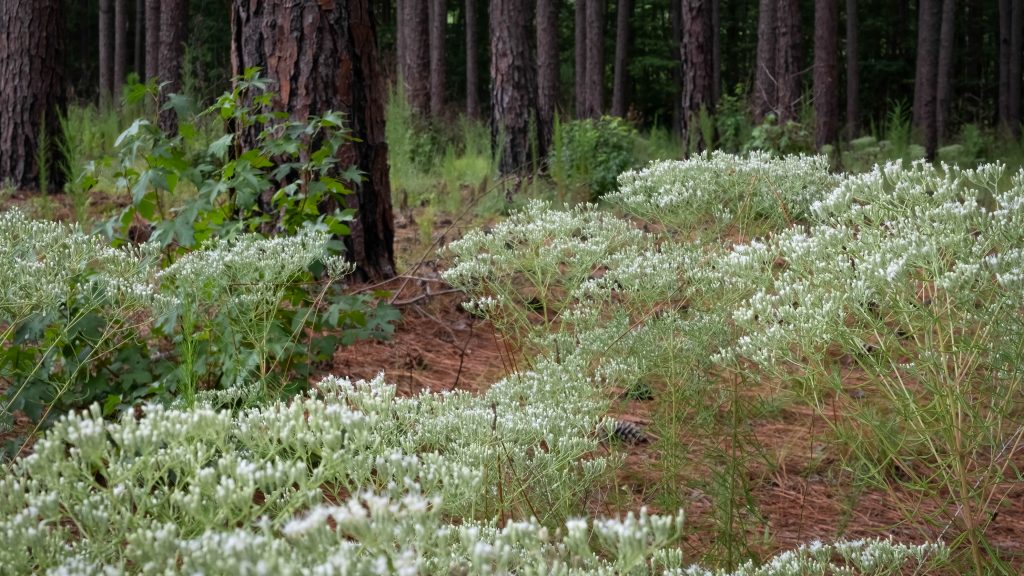Photo Gallery
Duke Forest note: The images below are all from Paul Travis in 2022, except for the noted ones from 1950 and 2018 from the Duke Forest archives. Click to enlarge. Higher resolution pictures available here.



A 1950 photo from the Duke archives highlighting the 15 year progression of the stand. [1950]














The view from the C72 harvest area towards the longleaf stand with typical American Burnwood establishment in cut over area.









Photography Manifest
| # | Photo file name | Date Taken | Comments and additional details |
|---|---|---|---|
| 1 | Ptravis_P22_115_Longleaf Pine Silviculture C72 [Aug 2022].jpg | 2022 | This stand was established in 1935 to test the viability of Longleaf Pine in the Duke Forest, the most NW corner of the natural range. |
| 2 | Ptravis_P22_115_Longleaf Sandy Soil [Sept 2022].jpg | 2022 | A site with sandy soil was chosen based on the preferred site conditions for the pine. |
| 3 | Ptravis_P22_115_Longleaf Pine History C72 [1950 – Duke Archives 1351] | 1950 | A 1950 photo from the Duke archives highlighting the 15 year progression of the stand. |
| 4 | Ptravis_P22_115_Loblolly and Longleaf Pines C51 [1950 – Duke Archives 1358] | 1950 | A photo from Compartment 51 highlighting similar plantings and differences between a Longleaf stand [Pinus palustris] and the neighboring Loblolly stand [Pinus taeda]. |
| 5 | Ptravis_P22_115_Longleaf Pine Stand C72 [Aug 2022].jpg | 2022 | The entrance to the stand via the Palustris Fire Trail. |
| 6 | Ptravis_P22_115_Longleaf Pine View C72 [Aug 2022].jpg | 2022 | A view from the recent harvest area in C72 that borders on the Longleaf Pine stand. |
| 7 | Ptravis_P22_115_Longleaf Pine C72 [Aug 2022].jpg | 2022 | Longleaf Pine, needles, 8 to 18 inches in length, in clusters of three. |
| 8 | Ptravis_P22_115_Longleaf vs Loblolly C72 [Aug 2022].jpg | 2022 | The cones of Longleaf are noticeably larger than Loblolly. |
| 9 | Ptravis_P22_115_Longleaf Understory – NextGen [Sept 2022].jpg | 2022 | Seedlings for Longleaf are established in the understory and demonstrate characteristics compatibility with a fire ecosystem. |
| 10 | Ptravis_P22_115_Longleaf Pine Canopy C72 [Aug 2022].jpg | 2022 | Tall trees seeking the sun. |
| 11 | Ptravis_P22_115_Longleaf Pine Forest Floor C72 [Aug 2022].jpg | 2022 | Understory has a forest floor cover of initial bush and weed species, minimal Longleaf seedlings. |
| 12 | Ptravis_P22_115_Longleaf Pine Fire Mgt [2018 – Duke Archives 2093] | 2018 | Fire is a key management tool for Longleaf stands. Eliminates competition and prepares the seedbed for Longleaf seed establishment. |
| 13 | Ptravis_P22_115_Longleaf Pine Burn [2018 Duke Archives 2073] | 2018 | Longleaf Pine is highly tolerant to fire as long as fuel content of understory is not excessively high. |
| 14 | Ptravis_P22_115_Longleaf Pine Prescribed Burn [2018 – Duke Archives 2111] | 2018 | Fire as a management tool. |
| 15 | Ptravis_P22_115_Longleaf Pine Pano C72 [Aug 2022].jpg | 2022 | Typical Longleaf forest floor with grasses and pine duff. |
| 16 | Ptravis_P22_115_Longleaf Pine Flowering Floor Hyssopleaf Thoroughwort [Eupatorium hyssopifolium] C72 [Aug 2022].jpg | 2022 | Initial forest floor can include pioneer species with wildflowers. |
| 17 | Ptravis_P22_115_Longleaf American Burnwood [Erechtites hieraciifolia] C72 [Aug 2022].jpg | 2022 | The view from the C72 harvest area towards the longleaf stand with typical American Burnwood establishment in cut over area. |
| 18 | Ptravis_P22_115_Longleaf Pine Cones & Grass C72 [Aug 2022] | 2022 | Typical Longleaf Pine forest floor with grasses and cones. |
| 19 | Ptravis_P22_115_Longleaf Pine Stand View C72 [Aug 2022].jpg | 2022 | Overview photo of the Longleaf stand. |
| 20 | Ptravis_P22_115_Longleaf Understory – Cicada Nymph [Sept 2022].jpg | 2022 | The Longleaf stand supports numerous insect populations. Some insects, like Pine Bark Beetle can cause tree damage over time. |
| 21 | Ptravis_P22_115_Tree Lizard [Sept 2022].jpg | 2022 | The Longleaf stand supports other wildlife like the Tree Lizard. |
| 22 | Ptravis_P22_115_Longleaf Pine Burn Chunk C72 [Aug 2022].jpg | 2022 | Evidence of prescribed burning. |
| 23 | Ptravis_P22_115_Longleaf Understory – Sweetgum [Sept 2022].jpg | 2022 | Some typical tree species, like Sweetgum, have found their way to the forest floor. |
| 24 | Ptravis_P22_115_Longleaf Pine Palustris FT C72 [Aug 2022].jpg | 2022 | The Palustris fire trail is used to help manage the prescribed burns on the Longleaf stand. |
| 25 | Ptravis_P22_115_Longleaf Pine Stand View_2 C72 [Aug 2022].jpg | 2022 | Typical view of the Longleaf Pine stand. |
| 26 | Ptravis_P22_115_Longleaf Pine Canopy_2 C72 [Aug 2022].jpg | 2022 | The trees reach for the light. |
1. Introduction | 2. Location | 3. Background | 4. H&S: Timeline | 5. H&S: Basic Silvics | 6. Photos | 7. References





